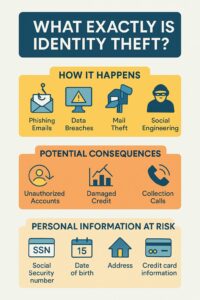What Exactly Is Identity Theft? A Clear Guide for Consumers
Identity theft is one of the fastest-growing threats impacting consumers today — and many people don’t realize they’ve become victims until real damage has already been done. Maybe you spot an account you never opened. Maybe your credit score suddenly drops. Or maybe you start receiving bills with your name on them, but none of the charges are yours.
So what exactly is identity theft? And why is it so harmful?
This guide breaks down what identity theft really is, how it happens, and what steps you can take if you believe someone has used your information without permission.
What Is Identity Theft?
Identity theft occurs when someone steals your personal information and uses it to impersonate you, usually for financial gain. This can include details such as:
- Your Social Security number
- Your date of birth
- Your address or phone number
- Your bank or credit-card information
- Account logins and passwords
Once a thief has access to this information, they may open new credit accounts, take out loans, apply for utilities, or even rent housing — all in your name. You’re then left to deal with the fallout: damaged credit, unauthorized debt, collection calls, and hours of stress trying to untangle the mess.
Identity Theft vs. Fraud vs. Data Breaches
Many consumers confuse these three terms, but they’re not the same.
Data Breach
This happens when your private information is exposed or stolen — often from a company’s database. It doesn’t always mean someone has used your information… yet.
Fraud
Fraud is when someone uses stolen information to make purchases, commit financial deception, or otherwise gain something of value.
Identity Theft
Identity theft goes a step further. It involves someone actively posing as you — opening accounts, creating debt, or accessing services using your personal details.
Think of it like this:
Data breach → identity theft risk → fraud happens once the information is used.
How Identity Theft Happens
Identity theft isn’t always the result of a sophisticated hacking scheme. In fact, some of the most common methods are surprisingly simple:
Phishing Emails & Fake Websites
Scammers often send emails pretending to be banks, delivery services, or government agencies, tricking victims into “verifying” their personal information.
Text Message Scams (Smishing)
A text may claim your package is delayed, your bank account is locked, or your password needs updating — all designed to steal your credentials.
Mail Theft
Bank statements, credit-card offers, medical bills, and tax documents can all be stolen right from your mailbox.
Public Wi-Fi Interception
Unsecured connections make it easy for criminals to capture passwords or financial information.
Data Breaches
Even major companies experience breaches where millions of customer records are exposed.
Social Engineering
Scammers may pose as customer-service representatives or government employees to “verify” your details.
Even small pieces of data — such as your birthday or address — can help criminals piece together a full identity profile.
Why Identity Theft Is So Harmful
Identity theft creates serious, long-lasting consequences, including:
Unauthorized Credit Accounts
Credit cards, personal loans, auto loans, and payday loans may be opened without your knowledge.
Damaged Credit Scores
Missed payments on fraudulent accounts can tank your credit, making it difficult to get approved for housing, financing, or even jobs.
Collection Calls
Debt collectors may pursue you for balances you never authorized.
Financial Stress & Lost Time
Victims often spend weeks or months fighting erroneous charges, disputing accounts, and cleaning up inaccurate credit reports.
Emotional Impact
Identity theft can cause anxiety, frustration, and a sense of violation — especially when the damage is significant.
Signs Your Identity May Have Been Stolen
Common red flags include:
- Accounts or inquiries you don’t recognize
- A sudden drop in your credit score
- Bills or statements for unfamiliar accounts
- Debt collectors calling for debts that aren’t yours
- Denials of credit you should qualify for
- IRS notices about income you didn’t earn
If any of these sound familiar, it’s important to act quickly.
What to Do If You Think You’re a Victim
- Place a fraud alert or credit freeze
- Review your credit reports for unfamiliar accounts
- Dispute inaccurate information with the credit bureaus
- Notify affected financial institutions
- Document all communication
- Seek legal help for ongoing credit-reporting issues or damages
Identity theft can be overwhelming — but you don’t have to navigate it alone.
How a Consumer Credit Lawyer Can Help
When identity theft damages your credit, a consumer credit lawyer plays a crucial role in helping you recover.
Your attorney can:
- Dispute fraudulent accounts
- Demand removal of inaccurate information
- Communicate with credit bureaus on your behalf
- Hold furnishers accountable if they fail to correct errors
- Help you restore your credit
- Seek compensation if your rights under the Fair Credit Reporting Act (FCRA) were violated
Removing identity-theft accounts isn’t always straightforward. Credit bureaus and lenders don’t always correct information the first time around — even when the evidence is clear. Legal support can make a significant difference in the outcome.
Key Takeaways
- Identity theft happens when someone uses your personal information without permission.
- It’s different from fraud or a simple data breach — it involves someone impersonating you.
- Thieves use phishing, mail theft, data breaches, and social engineering to steal information.
- Consequences range from credit damage to collection calls to severe financial stress.
- A consumer credit lawyer can help dispute fraudulent accounts and restore your credit.
Need Help After Identity Theft?
If you believe someone has misused your information or opened accounts in your name, your credit and financial stability may already be at risk.
Vullings Law Group, LLC is ready to help.
Contact Vullings Law Group, LLC for a free case review today.
Get guidance, support, and an advocate who will fight to protect your rights. Call today at 855-324-7263 or fill out our case review form.

